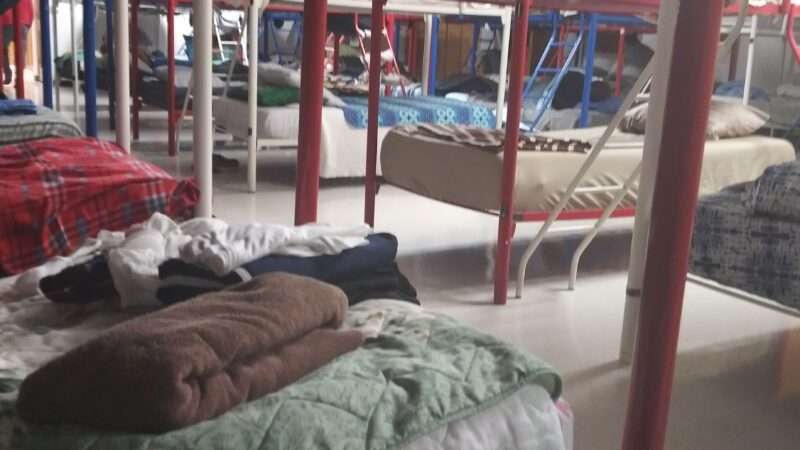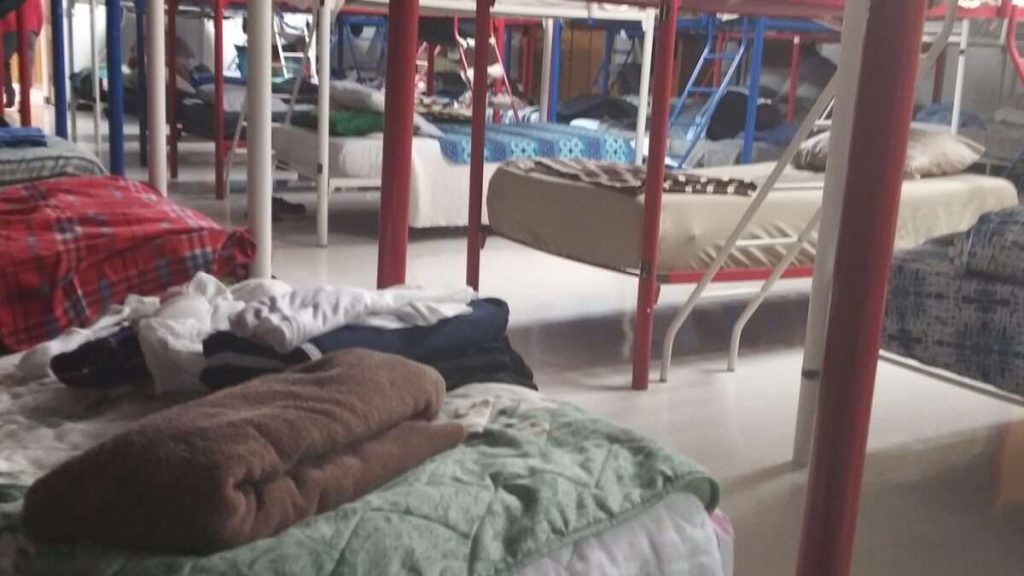
Happy Tuesday, and welcome to another edition of Rent Free. This week, we cover the battle between tribal government sovereignty and local land use law, the shortcomings of common antieviction policies, and a potential boom in modular housing construction.
Another Warming Center Goes to Court to Ensure It Can Open
Yet another homeless shelter has had to go to court to protect its ability to shelter people from the elements.
Last Wednesday, U.S. District Court Judge Mary K. Dimke issued a temporary restraining order preventing the city of Toppenish, Washington, from limiting the hours of operations of a cold weather shelter operated by the Yakama Nation tribal government in the town.
“We are thankful that the Court’s decision allows us to continue providing heat and shelter for our unhoused Yakama Members, as well as anyone else who needs shelter services in our Yakama Reservation Community,” Yakama Nation Tribal Council Chairman Gerald Lewis said in a statement to the Yakima Herald-Republic.
The Yakama Nation’s plan to open a 50-bed shelter in a building owned by a local Toppenish nonprofit had been in the works since September.
The initial plan had been to open the shelter on November 20 and operate it 24 hours a day during the cold winter months, giving the homeless a place to sleep, get a meal, and wash their clothes.
In the months leading up to that open date, the Yakama Nation had met multiple times with city officials to outline their plans and address any of the city’s concerns. According to court documents, the city didn’t formally support or oppose the new shelter.
But a few days prior to the shelter’s opening, Toppenish’s city manager sent the nation a letter saying that city regulations prevented the warming center from operating for more than six hours a day.
In a response letter, the Yakama Nation told the city that its rights under an 1855 treaty with the federal government prevented the city from regulating its shelter. With temperatures dropping below freezing, the Yakama Nation went ahead with its planned 24-hour operations.
When the city continued to try to restrict the shelter’s operations, the Yakama Nation sued in the U.S. District Court of Eastern Washington, demanding preliminary and permanent injunctions preventing Toppenish from regulating its shelter.
Limiting the shelter’s operations to just six hours a day “directly threaten the health and safety of enrolled Yakama Members, and therefore threaten the political integrity, health, and welfare of the Yakama Nation,” reads the lawsuit.
The city had been given until last Tuesday to respond to the nation’s lawsuit. When it didn’t, Judge Dimke issued a temporary restraining order that would allow the shelter to open for 24 hours.
In her decision, Dimke cited the below-freezing winter temperatures as evidence of irreparable harm that would result if the shelter weren’t’ allowed to open all day. She demurred on granting more permanent injunctive relief until the city responded to the nation’s lawsuit.
Local land use regulations often frustrate homeless shelters’ ability to serve people in need.
Recently, Rent Free covered the case of Kalispell, Montana, attempting to shut down the local Flathead Warming Center right as it was about to open for its winter season. Earlier this month, the warming center won a preliminary injunction allowing it to open while its lawsuit against the city plays out.
Study Finds Landlords Mostly Evict Tenants Who Will Never Pay Them
A new working paper on residential evictions finds that the costs of eviction are high to a landlord, that landlords frequently offer temporarily delinquent renters forbearance agreements as a result, and that the most common tenant protection policies likely do little to ultimately prevent evictions.
The paper, authored by researchers at Yale University, New York University, and the University of Chicago and uploaded to the National Bureau of Economic Research website this month, found that an eviction typically costs a landlord two to three months’ rent.
As a result “landlords usually allow tenants to default for multiple months before incurring the costs of eviction, and the majority of evictions involve tenants who are persistent non-payers,” researchers wrote.
The implication of these findings, researchers argue, is that common tenant protections like short-term rental assistance, extended eviction proceedings, and increased eviction filing fees do little to alter a landlord’s decision to pursue an eviction.
If a landlord expects a tenant is unlikely to ever pay rent again, they’ll be unmoved by the government providing short-term rental aid and undaunted by the costs of a lengthy eviction process. Eventually, they’re going to want their nonpaying tenant out.
On the flip side, if a landlord expects a tenant will return to paying rent, short-term rental aid or a yearlong eviction process is only a secondary deterrent to them pursuing an eviction. They were already willing to work out a deal.
Researchers argue that a primary effect of these tenant protection policies is to keep nonpaying tenants who’ll eventually be evicted in a unit for longer.
Is a Modular Housing Boom on the Horizon?
Affordable, mass-produced modular housing that’s snapped together onsite is a decades-old dream that always seems just out of reach. One of the nation’s largest apartment builders might be making mass modular housing a reality. The Wall Street Journal reports:
Greystar Real Estate Partners on Monday is opening a six-building modular apartment complex, complete with a gym, amphitheater and bocce courts. It is Greystar’s first U.S. project assembled using this alternative construction method, aiming to combat the chronic delays of traditional developments.
The new complex called “Ltd. Findlay” is located in Coraopolis, Pa., about 16 miles west of Pittsburgh. It is offering leases for 312 apartments, making it one of the largest multifamily modular projects in the U.S.
Ltd. Findlay is the first property developed at Greystar’s modular factory in Knox, Pa. The developer has six more modular projects in its U.S. pipeline that will also be built at the Knox site.
Unlike conventional on-site construction, modular homes are assembled in a factory, transported to the final building site and then stacked on top of each other like jumbo Lego blocks. Proponents say this type of building can be completed faster using fewer workers and with materials that can be purchased at a bulk discount, which can reduce overall costs.
You can read some of Rent Free‘s past coverage of the ups and downs of the manufactured housing industry here.
Quick Links
- More New Jersey communities have joined a lawsuit challenging a new state law that requires them to zone for an additional 85,000 affordable housing units over the next 10 years.
- Washington, D.C.’s Department of Transportation is finalizing rules that would make permanent the district’s temporary, pandemic-era Streatery Program.
- Texas is building gobs of housing, but not enough to prevent its housing shortage from getting worse, according to a recent report.
- New York’s pending City of Yes zoning reforms are considered a good “first step” by reform advocates, but it also falls short of what other cities with less steep housing crises have already done.
- Speaking of, New York Sen. Zellnor Myrie (D–Brooklyn) officially announced his plans to run for New York City mayor on an aggressively pro-YIMBY (yes in my backyard) platform today. His Rebuild NYC plan calls for getting New York City to start building at the rates of Tokyo, or at least Jersey City, through a mix of upzoning, building code reforms, and affordable housing mandates.
- Where could the federal government actually build “freedom cities”?
The post Tribal Sovereignty Saves a Homeless Shelter (For Now) appeared first on Reason.com.







